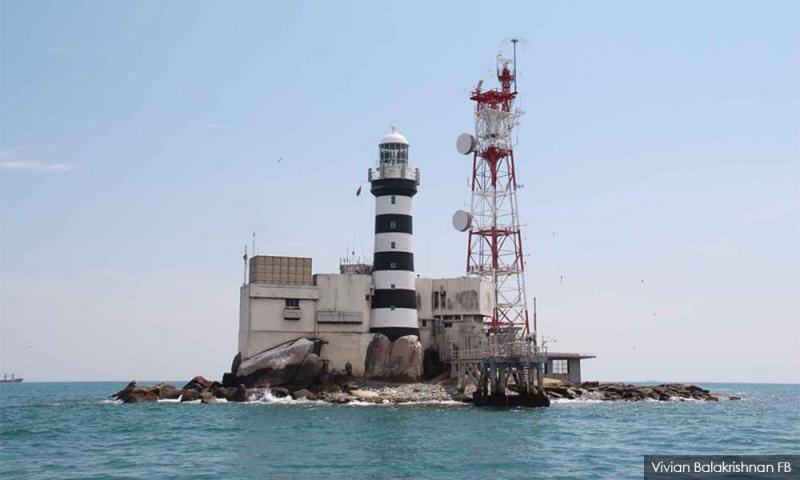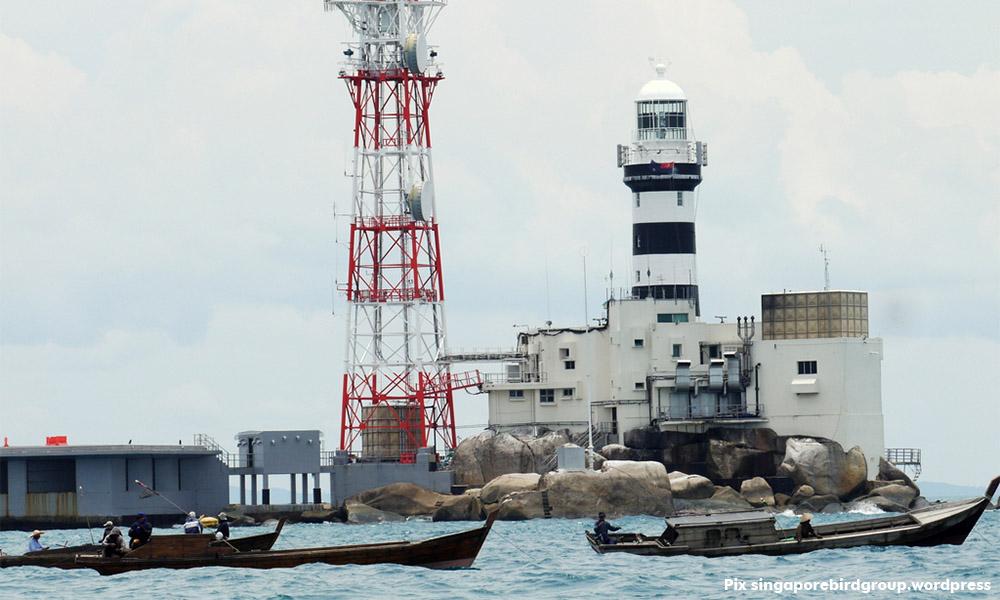
by P Ramasamy
ADUN SPEAKS | The ruler of Johor, Sultan Ibrahim Sultan Iskander, is rightly upset as to why the former government of Pakatan Harapan under Dr Mahathir Mohamad withdrew the appeal against the decision by the International Court of Justice (ICJ) to bestow sovereignty of the island of Pulau Batu Puteh in May 2008 on Singapore.
The ICJ recognised that Singapore, and not Malaysia, had sovereignty over Batu Puteh.
Pulau Batu Puteh is a rocky island off the coast of Johor with close proximity to Singapore.
Before the advent of the British, the island was under the sovereignty of the Johor sultanate until the establishment of the Straits Settlements in 1824 with the inclusion of Singapore, Malacca and Penang.
It was not that Johor gave up the sovereignty on the island, but the effective jurisdiction of the island took place in Singapore, a British colony.
It was not that Johor was not aware of the developments; in fact, when a lighthouse was built without seeking the permission of the Johor Sultan, a protest was lodged with the British.
Rose to prominence
But then, despite this, effective control of the island was exercised from Singapore in the colonial and post-colonial periods.
The Pulau Batu Puteh matter rose to prominence after a map drawn in 1979 included the island as a territory of Malaysia.
After some discussions, both the countries decided to ask the ICJ for compulsory adjudication.
In 2018, the ICJ decided in favour of Singapore.
Johor or Malaysia might have had sovereignty over the island before the advent of the British.
Symbolic sovereignty was one thing, but the effective control and management of the island were in the hands of the British and later with independent Singapore.
Strong links
I think ICJ took cognisance of the sovereignty of Johor over the island but decided to recognise Singapore on the grounds of effective occupation, control and administration.
Malaysia’s claim of sovereignty could not be backed up on the grounds of effective administration over the island.
I am not sure whether the Johor government or the sultan was consulted when the matter was referred to compulsory arbitration by both countries.

Since the Sultan of Johor did not raise the matter, I assume that there was consultation.
There were strong links between Johor and Pulau Batu Puteh, then known as Pedra Branca, a name given to the island by the Portuguese.
However, it was the British control of Singapore that eventually sealed the fate of Malaysia’s having sovereignty over the island.
Strategic error
Pulau Batu Puteh might not have any economic value, but its strategic maritime position cannot be underestimated.
The Harapan government of Mahathir might be entirely blamed for the withdrawal of the appeal in the ICJ.
It was a strategic error that Mahathir needs to explain.
While the decision to withdraw was Mahathir’s, the shoddy preparation of the appeal was the responsibility of the government of Najib Abdul Razak.
The decision to appeal was made in 2008, but it took the government nearly 10 years to prepare the appeal that was entrusted to former attorney-general Mohamed Apandi Ali.
Apandi could not prepare a watertight case to argue Malaysia’s position.
Apparently, no new evidence was obtained to justify the appeal.
Question of effective control
In a way, the new government that took power after the general election in May 2018 hurriedly withdrew the appeal without much consultation, something that is not acceptable to the Sultan of Johor.
Even when the matter went for arbitration to the ICJ, I was informed that Malaysia could not present an effective argument to counter Singapore’s well-prepared and well-articulated argument.
I don’t think that manner and style of presentation were the key points. Rather, it was the question of which country had effective control and jurisdiction over the island.
Even if the appeal was not well-prepared and that Malaysia had no new evidence or it was too costly, Mahathir should not have withdrawn the appeal.
The decision should have been left to the ICJ.
I am not sure that since the timing of the appeal had exceeded the 10-year limit, whether it could have been filed in the first place.

Mohamed Apandi Ali
If there was no new evidence to be adduced, the matter might not have merited the attention of the ICJ.
Apandi, who was recently appointed to a task force to review and recommend what the government should do about the matter, is the wrong choice.
He is one who is responsible for not preparing an effective appeal with the new information.
This was the reason why Mahathir later declined to go for judicial review of the matter and hence the application was withdrawn.
How Apandi is going to advise the government of Ismail Sabri Yaakob remains to be seen.
Ultimate resolution
I am not sure that the task force on Pulau Batu Puteh can make any headway in the ultimate resolution.
Malaysia might not have the benefit of new evidence and neither is time on its side.
It is pity that Malaysia lost sovereignty over Pulau Batu Puteh, an integral territory of the Johor sultanate, long before the coming of the British and the creation of independent Malaya.
It was a loss for Johor as well as for Malaysia. I can understand the displeasure of the Sultan of Johor.
RAMASAMY PALANISAMY is Perai assemblyperson and deputy chief minister II of Penang
ADUN SPEAKS | The ruler of Johor, Sultan Ibrahim Sultan Iskander, is rightly upset as to why the former government of Pakatan Harapan under Dr Mahathir Mohamad withdrew the appeal against the decision by the International Court of Justice (ICJ) to bestow sovereignty of the island of Pulau Batu Puteh in May 2008 on Singapore.
The ICJ recognised that Singapore, and not Malaysia, had sovereignty over Batu Puteh.
Pulau Batu Puteh is a rocky island off the coast of Johor with close proximity to Singapore.
Before the advent of the British, the island was under the sovereignty of the Johor sultanate until the establishment of the Straits Settlements in 1824 with the inclusion of Singapore, Malacca and Penang.
It was not that Johor gave up the sovereignty on the island, but the effective jurisdiction of the island took place in Singapore, a British colony.
It was not that Johor was not aware of the developments; in fact, when a lighthouse was built without seeking the permission of the Johor Sultan, a protest was lodged with the British.
Rose to prominence
But then, despite this, effective control of the island was exercised from Singapore in the colonial and post-colonial periods.
The Pulau Batu Puteh matter rose to prominence after a map drawn in 1979 included the island as a territory of Malaysia.
After some discussions, both the countries decided to ask the ICJ for compulsory adjudication.
In 2018, the ICJ decided in favour of Singapore.
Johor or Malaysia might have had sovereignty over the island before the advent of the British.
Symbolic sovereignty was one thing, but the effective control and management of the island were in the hands of the British and later with independent Singapore.
Strong links
I think ICJ took cognisance of the sovereignty of Johor over the island but decided to recognise Singapore on the grounds of effective occupation, control and administration.
Malaysia’s claim of sovereignty could not be backed up on the grounds of effective administration over the island.
I am not sure whether the Johor government or the sultan was consulted when the matter was referred to compulsory arbitration by both countries.

Since the Sultan of Johor did not raise the matter, I assume that there was consultation.
There were strong links between Johor and Pulau Batu Puteh, then known as Pedra Branca, a name given to the island by the Portuguese.
However, it was the British control of Singapore that eventually sealed the fate of Malaysia’s having sovereignty over the island.
Strategic error
Pulau Batu Puteh might not have any economic value, but its strategic maritime position cannot be underestimated.
The Harapan government of Mahathir might be entirely blamed for the withdrawal of the appeal in the ICJ.
It was a strategic error that Mahathir needs to explain.
While the decision to withdraw was Mahathir’s, the shoddy preparation of the appeal was the responsibility of the government of Najib Abdul Razak.
The decision to appeal was made in 2008, but it took the government nearly 10 years to prepare the appeal that was entrusted to former attorney-general Mohamed Apandi Ali.
Apandi could not prepare a watertight case to argue Malaysia’s position.
Apparently, no new evidence was obtained to justify the appeal.
Question of effective control
In a way, the new government that took power after the general election in May 2018 hurriedly withdrew the appeal without much consultation, something that is not acceptable to the Sultan of Johor.
Even when the matter went for arbitration to the ICJ, I was informed that Malaysia could not present an effective argument to counter Singapore’s well-prepared and well-articulated argument.
I don’t think that manner and style of presentation were the key points. Rather, it was the question of which country had effective control and jurisdiction over the island.
Even if the appeal was not well-prepared and that Malaysia had no new evidence or it was too costly, Mahathir should not have withdrawn the appeal.
The decision should have been left to the ICJ.
I am not sure that since the timing of the appeal had exceeded the 10-year limit, whether it could have been filed in the first place.

Mohamed Apandi Ali
If there was no new evidence to be adduced, the matter might not have merited the attention of the ICJ.
Apandi, who was recently appointed to a task force to review and recommend what the government should do about the matter, is the wrong choice.
He is one who is responsible for not preparing an effective appeal with the new information.
This was the reason why Mahathir later declined to go for judicial review of the matter and hence the application was withdrawn.
How Apandi is going to advise the government of Ismail Sabri Yaakob remains to be seen.
Ultimate resolution
I am not sure that the task force on Pulau Batu Puteh can make any headway in the ultimate resolution.
Malaysia might not have the benefit of new evidence and neither is time on its side.
It is pity that Malaysia lost sovereignty over Pulau Batu Puteh, an integral territory of the Johor sultanate, long before the coming of the British and the creation of independent Malaya.
It was a loss for Johor as well as for Malaysia. I can understand the displeasure of the Sultan of Johor.
RAMASAMY PALANISAMY is Perai assemblyperson and deputy chief minister II of Penang
I am not sure why we still refer to the island as Pulau Batu Puteh.
ReplyDeleteWe lost the case - it is now officially a Singapore territory. So, be a gentleman and not appear as sore losers and call it by its rightful name that is Pedra Branca
The 2004-2008 case presented by Malaysia at the ICJ was a weak one.
ReplyDeleteThat is the Original Strategic Error, unless your interest is just to Hentam Mahathir by whatever means necessary.
As Hollywood movies would say "With due respect, It Sucks".
I didn't hear even a squeak from Ramasamy back in 2004-2008.
From the ICJ Judgement - Conclusion
ReplyDeleteThe ICJ were of the opinion that Singapore had gained sovereignty over Pulau Batu Puteh from 1980 onwards. Even before Toonsie 1.0.
Malay-sia and Johor did not take action BEFORE 1980 to show the pulau belongs to us - that was the cause of the loss.
https://www.kln.gov.my/pbp-icj/images/icj_judgment/14506.pdf
The fact that "new discovery" of evidence was uncovered in the UK Archives many years after this case was concluded only shows that we did not do proper research before the original case in 2008. These archives were there all along. Why didn't we find them? We did not do proper homework.
QUOTE
The Court is of the opinion that the relevant facts, including the conduct of the Parties, reflect a convergent evolution of the positions of the Parties regarding title to Pedra Branca/Pulau Batu Puteh. The Court concludes, especially by reference to the conduct of Singapore and its predecessors à titre de souverain, taken together with the conduct of Malaysia and its predecessors including their failure to respond to the conduct of Singapore and its predecessors, that by 1980
sovereignty over Pedra Branca/Pulau Batu Puteh had passed to Singapore.
For the foregoing reasons, the Court concludes that sovereignty over Pedra Branca/Pulau Batu Puteh belongs to Singapore.
UNQUOTE
QUOTE
Application requesting interpretation of 2008 judgment and subsequent withdrawal
On 2 February 2017, Malaysia applied to the ICJ pursuant to Article 61 of the Statute of the ICJ for the revision of the 2008 judgment on the basis of three documents it had obtained from The National Archives of the UK between August 2016 and January 2017. The documents were internal correspondence of Singapore's colonial government in 1958, an incident report submitted by a British naval officer in the same year, and a 1960s map of naval operations bearing annotations. The Malaysian Government said that these documents indicated that "officials at the highest levels in the British colonial and Singaporean administration appreciated that Pedra Branca/Pulau Batu Puteh did not form part of Singapore’s sovereign territory" during the relevant period. Therefore, "the Court would have been bound to reach a different conclusion on the question of sovereignty over Pedra Branca/Pulau Batu Puteh had it been aware of this new evidence". However, according to Shahriman Lockman, a senior analyst at Malaysia's Institute of Strategic and International Studies, "there’s very little precedent for revisions to ICJ judgments". Reports suggest that the timing of the application coincides with the upcoming elections in Malaysia, as the ruling Barisan Nasional Coalition, which is currently under pressure over the IMDB scandal, could "use the renewed legal fight over Pedra Branca as a means to show it was 'best placed to display strong leadership in the country's foreign policy so as to safeguard Malaysia's sovereignty'"
UNQUOTE
The 2004-2008 vase presented by Malaysia at the ICJ was weak, sloppy, lazy , ill-prepared and incompetent.
DeleteDid anyone in the Malaysian Government held accountable for it ?
No.
So Mahathir came in 2018, at the final tail end , and this new Kerbau Task Force is meant to dump the blame on it.
What a lot of smelly POO